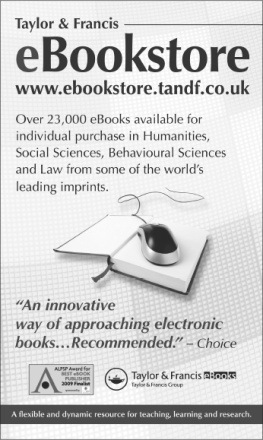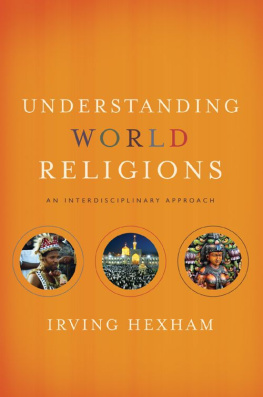Japanese Religions and
Globalization
This book analyzes the variety of ways through which Japanese religions (Buddhism, Shint, and new religious movements) contribute to the dynamics of accelerated globalization in recent decades. It looks at how Japanese religions provide material to cultural global flows, thus acting as carriers of globalization, and how they respond to these flows by shaping new global identities.
The book highlights how, paradoxically, these processes of religious hybridization may be closely intertwined with the promotion of cultural chauvinism. It shows how, on the one hand, religion in Japan is engaged in border negotiation with global subsystems such as politics, secular education, and science, and how, on the other hand, it tries to find new legitimation by addressing pressing global problems such as war, the environmental crisis, and economic disparities left unsolved by the dominant subsystems.
A significant contribution to advancing an understanding of modern Japanese religious life, this book is of interest to academics working in the fields of Japanese studies, Asian history and religion, and the sociology of religion.
Ugo Dess is a lecturer at the Institute of Religious Studies at the University of Leipzig, Germany. He has published widely on Shin Buddhism and Japanese religions.
Routledge Studies in Asian Religion and Philosophy
1 Deconstruction and the Ethical in Asian Thought
Edited by Youru Wang
2 An Introduction to Daoist Thought
Action, language, and ethics in Zhuangzi
Eske Mllgaard
3 Religious Commodifications in Asia
Marketing gods
Edited by Pattana Kitiarsa
4 Christianity and the State in Asia
Complicity and conflict
Edited by Julius Bautista and Francis Khek Gee Lim
5 Christianity in Contemporary China
Socio-cultural perspectives
Edited by Francis Khek Gee Lim
6 The Buddha and Religious Diversity
J. Abraham Velez de Cea
7 Japanese Religions and Globalization
Ugo Dess
Japanese Religions and
Globalization
Ugo Dess

First published 2013
by Routledge
2 Park Square, Milton Park, Abingdon, Oxon OX14 4RN
Simultaneously published in the USA and Canada
by Routledge
711 Third Avenue, New York, NY 10017
Routledge is an imprint of the Taylor & Francis Group, an informa business
2013 Ugo Dess
The right of Ugo Dess to be identified as author of this work has been asserted by him/her in accordance with sections 77 and 78 of the Copyright, Designs and Patents Act 1988.
All rights reserved. No part of this book may be reprinted or reproduced or utilised in any form or by any electronic, mechanical, or other means, now known or hereafter invented, including photocopying and recording, or in any information storage or retrieval system, without permission in writing from the publishers.
Trademark notice : Product or corporate names may be trademarks or registered trademarks, and are used only for identification and explanation without intent to infringe.
British Library Cataloguing in Publication Data
A catalogue record for this book is available from the British Library
Library of Congress Cataloging in Publication Data
Dess, Ugo.
Japanese religions and globalization: Ugo Dess.
p. cm. (Routledge studies in Asian religion and philosophy; 7)
Includes bibliographical references and index.
1. JapanReligion. 2. Globalization. I. Title.
BL2202.3.D47 2013
200.952dc23 2012032162
ISBN: 978-0-415-81170-5 (hbk)
ISBN: 978-0-203-06661-4 (ebk)
Typeset in Times New Roman
by Sunrise Setting Ltd, Paignton, UK
Contents
Author's Note
In this volume, Japanese is romanized according to the modified Hepburn system. Japanese characters are provided on first occurrence of relevant terms in each chapter. Following convention, Japanese names are written with the surname first. Unless otherwise specified, the translations are mine wherever the titles are in Japanese and German.
Acknowledgments
An earlier version of this book was written to satisfy the requirements for the Habilitation (the German qualification for a full university professorship) granted to the author by the Universitt Leipzig (Fakultt fr Geschichte, Kunst- und Orientwissenschaften) in 2012. In this connection, I would like to thank the Habilitationskommission and the three reviewers, professors Christoph Kleine, Hubert Seiwert, and Galen Amstutz, for their warm appreciation of my work and valuable comments. I am also grateful to Dorothea Schaefter and Jillian Morrison, of Routledge, and to two anonymous referees for their precious comments. Many thanks also go to Ian Reader for his comments. This research has been made possible by the kind collaboration, during my residence and fieldwork in Japan (especially 20092010), of many people among the religious groups analyzed, whom I would like to warmly thank collectively here. I also wish to thank Professor Yuki Hideo and Ms Kawarazaki Keiko of the NCC Center for the Study of Japanese Religions in Kyto, and several colleagues within the Japanese Association for Religious Studies and the Japan Association of Religion and Ethics. Many friends have also been very helpful in various ways. I would like to express here my special thanks to Kanno Rui, Martin Repp, Kikuchi Masumi, Yamamoto Jh, my friends at Mikan, Hishiki Masaharu, and Yamauchi Sayoko. The Institute of Religious Studies of the Universitt Leipzig has offered me, since May 2011, a quiet environment in which to complete the manuscript. In this connection, I would like to thank my colleagues and the students of my seminar on Japanese Religions and Globalization for their feedback. Earlier versions of parts of appeared in the Journal of Religion in Japan 1/2 (2012). Last, but not least, the completion of this book would have been hardly conceivable without Elisabetta's continuous encouragement, comments, and support.
Leipzig, July 2012.
Introduction
Terms related to globalization have been increasingly incorporated in ongoing communication within the Japanese religious world. In line with this trend, a publication such as the Gurkaru Tenri  (Glocal Tenri), the bulletin of the research institute of the new religious movement Ten3riky
(Glocal Tenri), the bulletin of the research institute of the new religious movement Ten3riky  has been issued since 2000 with the explicit intent of addressing issues related to globalism and localism; the president of the Zen-nihon Bukkykai
has been issued since 2000 with the explicit intent of addressing issues related to globalism and localism; the president of the Zen-nihon Bukkykai  (Japan Buddhist Federation) has recently signed, together with other world religious leaders, the Global Appeal to End Stigma and Discrimination Against People Affected by Leprosy; columns in the Ksei shinbun
(Japan Buddhist Federation) has recently signed, together with other world religious leaders, the Global Appeal to End Stigma and Discrimination Against People Affected by Leprosy; columns in the Ksei shinbun  (Ksei newspaper), the official megaphone of another new religious movement, Rissh Kseikai
(Ksei newspaper), the official megaphone of another new religious movement, Rissh Kseikai  explain to readers the true (religious) meaning of the word globalization; and references to globalization and various global issues are constant presences in the annual peace proposals and in other writings by Ikeda Daisaku
explain to readers the true (religious) meaning of the word globalization; and references to globalization and various global issues are constant presences in the annual peace proposals and in other writings by Ikeda Daisaku  the president of Soka Gakkai International (SGI), the religious organization that is perhaps at the forefront in this process of incorporation. These few examples hint at the various guises in which globalization terminology may find its way into the language of Japanese religious organizations. Needless to say, at the general level all this reveals an increased and even genuine interest by religious people in Japan in issues related to the world at large. One may ask, however, to what extent the discourse on globalization within Japanese religions may also be accompanied by their actual involvement in the dynamics of globalization.
the president of Soka Gakkai International (SGI), the religious organization that is perhaps at the forefront in this process of incorporation. These few examples hint at the various guises in which globalization terminology may find its way into the language of Japanese religious organizations. Needless to say, at the general level all this reveals an increased and even genuine interest by religious people in Japan in issues related to the world at large. One may ask, however, to what extent the discourse on globalization within Japanese religions may also be accompanied by their actual involvement in the dynamics of globalization.







 (Glocal Tenri), the bulletin of the research institute of the new religious movement Ten3riky
(Glocal Tenri), the bulletin of the research institute of the new religious movement Ten3riky  has been issued since 2000 with the explicit intent of addressing issues related to globalism and localism; the president of the Zen-nihon Bukkykai
has been issued since 2000 with the explicit intent of addressing issues related to globalism and localism; the president of the Zen-nihon Bukkykai  (Japan Buddhist Federation) has recently signed, together with other world religious leaders, the Global Appeal to End Stigma and Discrimination Against People Affected by Leprosy; columns in the Ksei shinbun
(Japan Buddhist Federation) has recently signed, together with other world religious leaders, the Global Appeal to End Stigma and Discrimination Against People Affected by Leprosy; columns in the Ksei shinbun  (Ksei newspaper), the official megaphone of another new religious movement, Rissh Kseikai
(Ksei newspaper), the official megaphone of another new religious movement, Rissh Kseikai  explain to readers the true (religious) meaning of the word globalization; and references to globalization and various global issues are constant presences in the annual peace proposals and in other writings by Ikeda Daisaku
explain to readers the true (religious) meaning of the word globalization; and references to globalization and various global issues are constant presences in the annual peace proposals and in other writings by Ikeda Daisaku  the president of Soka Gakkai International (SGI), the religious organization that is perhaps at the forefront in this process of incorporation. These few examples hint at the various guises in which globalization terminology may find its way into the language of Japanese religious organizations. Needless to say, at the general level all this reveals an increased and even genuine interest by religious people in Japan in issues related to the world at large. One may ask, however, to what extent the discourse on globalization within Japanese religions may also be accompanied by their actual involvement in the dynamics of globalization.
the president of Soka Gakkai International (SGI), the religious organization that is perhaps at the forefront in this process of incorporation. These few examples hint at the various guises in which globalization terminology may find its way into the language of Japanese religious organizations. Needless to say, at the general level all this reveals an increased and even genuine interest by religious people in Japan in issues related to the world at large. One may ask, however, to what extent the discourse on globalization within Japanese religions may also be accompanied by their actual involvement in the dynamics of globalization.